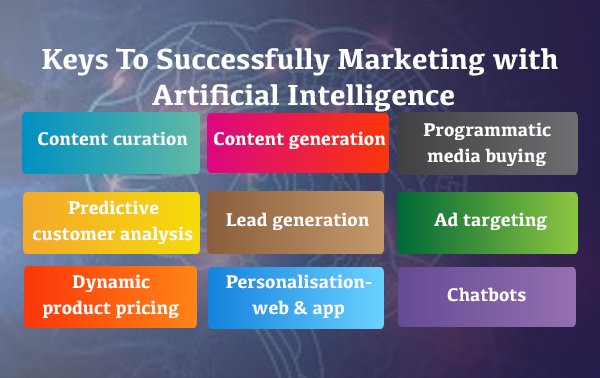Artificial Intelligence (AI) is one of the hottest topic in digital marketing these days. Being a broad term it covers a wide range of technological advancements. However, artificial intelligence means the technology which can mimic human intelligence such as voice, machine learning, image recognition and semantic search. AI has been broken down into three categories such as machine learning techniques, applied propensity model and AI applications.
Machine learning makes use of algorithms to learn from the data sets which helps create propensity models. Applied propensity is when these models are actually put to use. While AI applications are the task which is mainly associated with human behaviour such as writing content, answering customer questions and so on.
Let’s look at some of the ways to leverage artificial intelligence in marketing:
- Content curation
AI helps you engage better visitors on website by showing relevant content. It can be applied to varied mediums such as blogs, personalised site messaging and so on. AI is an excellent technique for subscription business where the person uses algorithms for better content recommendations.
- Content generation
Though interesting, AI cannot write a political opinion or a blog post on its own. However, there are several practice or advice where AI generated content can be very useful and help you draw visitors on the site. AI writers help in writing reports on data-focused and regular events. It is one of the useful component of content marketing strategy.
- Programmatic media buying
Propensity models generated by machine learning algorithms are used for programmatic media buying to effectively target ads to the relevant customers. It also helps recognise questionable sites and eliminates from the list of sites where ads can be placed.
- Predictive customer analysis
Propensity model can be used in various areas for predicting the interest and likelihood of the customer. It is referred to as predictive analysis as it uses analytics data to make predictions of the customer behaviour. However, ensure that the data you provide is crisp and accurate.
- Lead generation
Propensity models generated by machine learning can be used to generate leads based on specific criteria which helps sales team to know the importance and quality of leads. This helps save time and focus on the most effective leads.
- Ad targeting
Machine learning algorithms is a great way to run through historical data to create best performing ads. Using this data, they can also provide them with the reliable and effective content when they need. You can also establish effective ad and content placement.
- Dynamic product pricing
Marketing professionals know that discounts are effective. Hence, dynamic price optimisation can be done using machine learnings to correlate the pricing trends along with the sales trends and other factors which include inventory and category.
- Personalisation- web & app
Propensity model can help you predict the journey of buyer on website or app. If the user is new the content shared ensures keeping them interested through informing about the products, sharing the benefits of products and so on.
- Chatbots
Chatbots mimic human intelligence to resolve customer queries and complete the order process. It is an excellent, effective and easy way to keep conversations with customers.
Wrap up
While artificial intelligence is taking over the human approach, it still has a long way to go. It is a great opportunity for brands to connect with customers in an innovative way.


